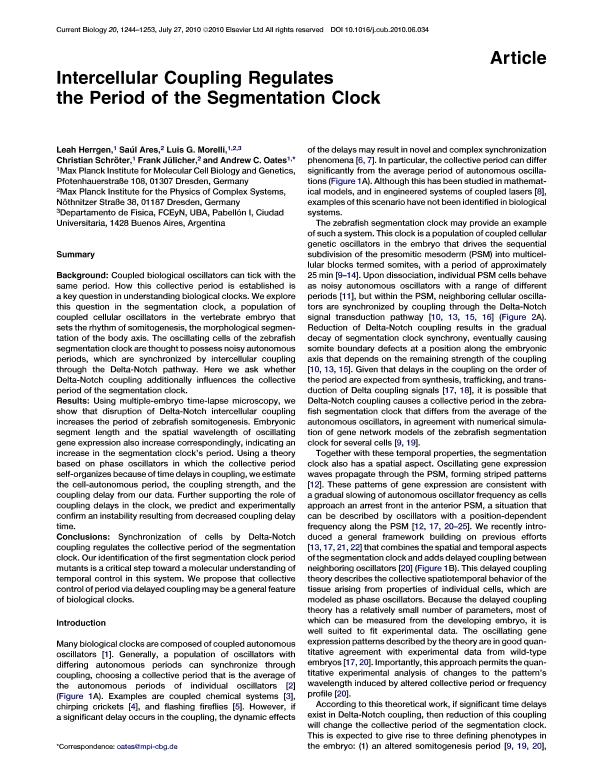Mostrar el registro sencillo del ítem
dc.contributor.author
Herrgen, Leah
dc.contributor.author
Ares, Saúl
dc.contributor.author
Morelli, Luis Guillermo

dc.contributor.author
Schroter, Christian

dc.contributor.author
Jülicher, Frank
dc.contributor.author
Oates, Andrew C.

dc.date.available
2018-09-11T18:00:23Z
dc.date.issued
2010-07
dc.identifier.citation
Herrgen, Leah; Ares, Saúl; Morelli, Luis Guillermo; Schroter, Christian; Jülicher, Frank; et al.; Intercellular coupling regulates the period of the segmentation clock; Cell Press; Current Biology; 20; 14; 7-2010; 1244-1253
dc.identifier.issn
0960-9822
dc.identifier.uri
http://hdl.handle.net/11336/59122
dc.description.abstract
Background: Coupled biological oscillators can tick with the same period. How this collective period is established is a key question in understanding biological clocks. We explore this question in the segmentation clock, a population of coupled cellular oscillators in the vertebrate embryo that sets the rhythm of somitogenesis, the morphological segmentation of the body axis. The oscillating cells of the zebrafish segmentation clock are thought to possess noisy autonomous periods, which are synchronized by intercellular coupling through the Delta-Notch pathway. Here we ask whether Delta-Notch coupling additionally influences the collective period of the segmentation clock. Results: Using multiple-embryo time-lapse microscopy, we show that disruption of Delta-Notch intercellular coupling increases the period of zebrafish somitogenesis. Embryonic segment length and the spatial wavelength of oscillating gene expression also increase correspondingly, indicating an increase in the segmentation clock's period. Using a theory based on phase oscillators in which the collective period self-organizes because of time delays in coupling, we estimate the cell-autonomous period, the coupling strength, and the coupling delay from our data. Further supporting the role of coupling delays in the clock, we predict and experimentally confirm an instability resulting from decreased coupling delay time. Conclusions: Synchronization of cells by Delta-Notch coupling regulates the collective period of the segmentation clock. Our identification of the first segmentation clock period mutants is a critical step toward a molecular understanding of temporal control in this system. We propose that collective control of period via delayed coupling may be a general feature of biological clocks. © 2010 Elsevier Ltd. All rights reserved.
dc.format
application/pdf
dc.language.iso
eng
dc.publisher
Cell Press

dc.rights
info:eu-repo/semantics/openAccess
dc.rights.uri
https://creativecommons.org/licenses/by-nc-sa/2.5/ar/
dc.subject
Devbio
dc.subject.classification
Otras Ciencias Biológicas

dc.subject.classification
Ciencias Biológicas

dc.subject.classification
CIENCIAS NATURALES Y EXACTAS

dc.subject.classification
Otras Ciencias Biológicas

dc.subject.classification
Ciencias Biológicas

dc.subject.classification
CIENCIAS NATURALES Y EXACTAS

dc.title
Intercellular coupling regulates the period of the segmentation clock
dc.type
info:eu-repo/semantics/article
dc.type
info:ar-repo/semantics/artículo
dc.type
info:eu-repo/semantics/publishedVersion
dc.date.updated
2018-09-10T16:33:04Z
dc.journal.volume
20
dc.journal.number
14
dc.journal.pagination
1244-1253
dc.journal.pais
Estados Unidos

dc.journal.ciudad
Nueva York
dc.description.fil
Fil: Herrgen, Leah. Max Planck Institute Of Molecular Cell Biology And Genetics; Alemania
dc.description.fil
Fil: Ares, Saúl. Max Planck Institute For The Physics Of Complex Systems; Alemania
dc.description.fil
Fil: Morelli, Luis Guillermo. Universidad de Buenos Aires; Argentina. Consejo Nacional de Investigaciones Científicas y Técnicas. Oficina de Coordinación Administrativa Ciudad Universitaria. Instituto de Física de Buenos Aires. Universidad de Buenos Aires. Facultad de Ciencias Exactas y Naturales. Instituto de Física de Buenos Aires; Argentina
dc.description.fil
Fil: Schroter, Christian. Max Planck Institute Of Molecular Cell Biology And Genetics; Alemania
dc.description.fil
Fil: Jülicher, Frank. Max Planck Institute For The Physics Of Complex Systems; Alemania
dc.description.fil
Fil: Oates, Andrew C.. Max Planck Institute Of Molecular Cell Biology And Genetics; Alemania
dc.journal.title
Current Biology

dc.relation.alternativeid
info:eu-repo/semantics/altIdentifier/url/http://www.sciencedirect.com/science?_ob=MiamiImageURL&_cid=272099&_user=10&_pii=S0960982210007815&_check=y&_coverDate=2010-07-27&view=c&_gw=y&wchp=dGLzVlS-zSkWb&md5=49f3c899e3351ccf0603d7a3676311f8/1-s2.0-S0960982210007815-main.pdf
dc.relation.alternativeid
info:eu-repo/semantics/altIdentifier/doi/http://dx.doi.org/10.1016/j.cub.2010.06.034
Archivos asociados
